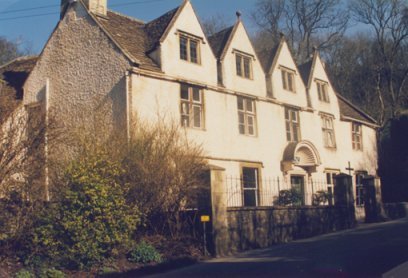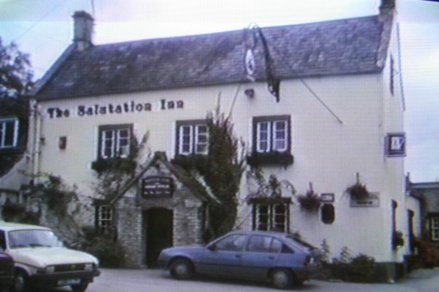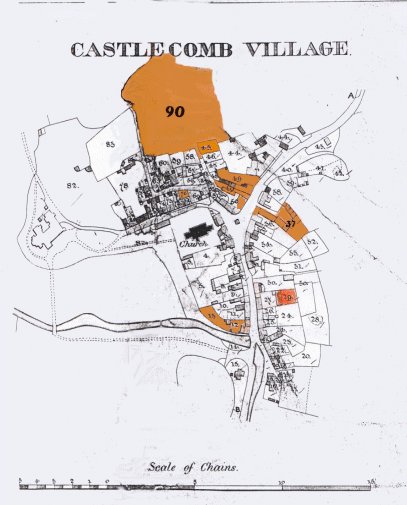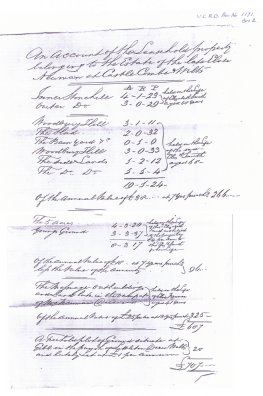|
Elver NEWMAN
Although I had read in the Newman family bible that Elver Newman (the father of my three times great grandfather, Thomas Newman) had married Sarah Coleman on the 17th January 1788 there was no mention in the bible of where this marriage had taken place. There search was on. I trailed through all the counties of England in the International Genealogical Index (IGI) of the Church of Latter Day Saints without success. I joined the Newman Name Society and asked for advice there. Someone suggested that there were quite a large number of Newmans in the north Wiltshire area that were not mentioned on the IGI and that a Barbara Carter had compiled an Index of names in that area called the Nimrod Index. I wrote to her and received the following information. "Elver Newman married Sarah Coleman on the 17th January 1788 in Castle Combe, Wiltshire" Eureka - they were found. This exactly matched the date of the marriage in the family bible. The rest was a matter of studying a film of the Parish Records of births, marriages and deaths registers of Castle Combe in the Family History Centre of the Church of Latter Day Saints in Newport, Isle of Wight and later a printed copy of the parish registers produced by the Wiltshire Family History Society. I was then able to trace the Newman family in Castle Combe back to my five times Great Grandfather William(1) c.1687 - 1762. Elver Newman was the fourth of the six children of William(2) and Ann Newman, né Jenkins. He was baptised on the 9th December 1768 at the church of St Andrew, Castle Combe. Two of his siblings (both William) died in infancy and another two (John and Mary) died aged 39 and 12 respectively. This left only Elver and his younger sister Elizabeth (see Family Tree,) As Elver's mother (Ann JENKINS) had been the only surviving descendant of the Jenkins family and his grandmother (Elizabeth ELVER) the only surviving member of the Elver family this meant that Elver Newman was in the fortunate position of inheriting a great deal of property from these successful and well to do families. At the time of his marriage, Elver is described as a yeoman living in Yatton Keynell, which is a village very near to Castle Combe. A yeoman is a farmer working his own land although not necessarily owning it. He seems to have come to live in Castle Combe after his marriage however, as all of his children were born there according to the parish register. There is a great deal more documentary evidence for Elver than there is for either his father or grandfather or for his son Thomas. His holdings of land whether freehold, copyhold or leasehold are all well documented in the papers of the Lord of the Manor, George Scrope. His land is shown and named on the Tithe maps of Castle Combe and Hullavington and his land tax assessments are also listed. He also appears on the Registers of Electors and in the Poll Books as well as being listed as a Church Warden of St Andrews Church. He inherited quite a lot of land and houses and an inn from his father (who had inherited it from his mother, Elizabeth, né Elver) and from his mother, Ann, né Jenkins, he inherited The Salvation Inn at the Gib not far from Upper Castle Combe. He added to these considerably himself. One of his chief acquisitions was the Dower House or Great House. This was the biggest and most imposing house in the village and had once been lived in by a member of the Scrope family, the lords of the Manor of Castle Combe. It had a considerable amount of land as well. Elver and his wife and family lived in this house. There is a shield with the Scrope arms on it in the "Shell" above the front door. | ||
| ||
|
| ||
|
When Elver was a child he would have seen a different village, or town as it was then, from what we see today and as he grew he would have witnessed many changes. Castle Combe was a very important market town, with a market every Monday in its centre. It was the biggest market in north Wiltshire. At first the Bybrook carried much more water and was capable of powering several mills producing the local red and white woollen cloth, called Castlecombe cloth. In the fields beside the brook would be cloth being stretched on the "tenter hook" frames. But the Bybrook was already losing much of its water and the mills were being pulled down. The houses of the spinners and weavers, down by the brook, which are now desirable homes were falling into disrepair. Instead of a prosperous market town it shrank to village status and reverted to basing its economy on agriculture. England was rapidly advancing towards the Industrial Revolution during Elver's lifetime. James Watt was one of the inventors who helped towards this. Castle Combe had owed much of its prosperity to its woollen industry and as well as the lack of sufficient water in Bybrook to power the mills the invention of machinery used in other towns probably helped towards the demise of this industry in Castle Combe. In Elver's time the houses of the village would have been covered with plaster, hiding the stone which is so much admired today. Any remaining houses with plaster covering today, like the Dower House, are protected and no more plaster is allowed to be removed. The house which was the Leet Court House would not have been showing its exposed beams. In the village of Castle Combe itself the land and property was mostly owned by the lord of the manor so this would have been leased by Elver. The practice was to lease it for the lives of three relatives. When all of those people had died then the property reverted to the lord. Some property was held by Copyhold, which was virtually ownership. I have copies of some rather interesting correspondence between the Lord of the Manor, William Scrope, and his manager written after Elver had died. It was about land that the Newman family had had and Elver's Widow, Sarah, was obviously trying to hang on to in spite of the fact that all three of the people on whose lives it had been leased i.e. Elver Newman, Thomas Newman and William Beard Newman had died. Part of one of Scrope's letters reads as follows:-
| ||
|
To me this shows that the Newman's were very independent people - not inclined to bow down to the wishes of the Lord of the Manor. The "miserable bit of land at Gib" must have been near the Salutation Inn which was leased by Elver Newman, having been inherited from his mother, Ann Jenkins. The Inn is listed as not only being an inn but also a farm and for many years it was let by Elver to his sister, Elizabeth and her husband. The Inn was also used for meetings in October of each year by the Castle Combe Association which dealt with the prevention of Robberies and Thefts by offering rewards ranging from five guineas for information concerning murder and highway robbery to ten shillings for information about damaging tools or trees. Elver belonged to this Association. The Salutation Inn is in a fairly isolated position even today so may well have been the haunt of highwaymen. | ||
|
| ||
|
Elver appears to have been on good terms with his large family, of thirteen children. Six sons, William Beard, Thomas, James, Elver Dolman, Henry and George and two daughters, Frances and Mary survived him. One son, John Coleman, predeceased him having died at the age of 27, and another son, Edmund, died in infancy. Three daughters, Elizabeth, Ann Elver and Sarah also predeceased him, Elizabeth dying at age 35 and Ann Elver at 36, fourteen years after her marriage to Michael Sumsion. His youngest daughter, Sarah died shortly before he did. William Beard and James became his executors. William Beard practised as a surgeon in the nearby town of Corsham and died in Jamaica, James farmed his father's properties in nearby Hullavaton, George took over the leather curing business at The George in Castle Combe, Thomas had moved to Marshfield in Gloucestershire where he practised as a surgeon and apothecary, Elver Dolman remained living in Castle Combe for awhile in the Dower House, practising as a druggist, however he moved to Bitton, Wiltshire and died there. Beethoven was composing his music during Elver's life, Jane Austen was writing her novels and Mrs Sarah Siddons was drawing the crowds to her acting upon the stages of London. In a long and complicated will Elver left all of his household goods, furniture, plate, linen, china and household effects and his wine, spirits, beer and other liquors to his wife Sarah for her "to have the use and enjoyment of during her life also the house and premises in which I now reside". She was also to have all the "rents, issues and profits, interest, dividends and annual proceeds of my said Real, Copyhold and Personal Estate ...for and during the term of her natural life for her absolute use and benefit". After her death the estate was to be divided into nine equal parts and distributed between his nine surviving children or their children if they had died. He made one extra legacy and that was to his youngest daughter, Sarah, to whom he left œ100 to be paid within six months of his death. One wonders what was special about Sarah. She appears to be unmarried. She actually died a few months before her father so would not have got her inheritance. In Elver's will he leaves one ninth of his estate to his daughter Frances who seems to have married the husband of her dead sister, Ann Elver. The words in the will are "to my daughter Frances present wife of the said Michael Sumsion". As it was very much against Church law to marry your dead sister's husband I don't know how they managed to do this. I can certainly not find any record of the marriage in this area. There is on record an earlier marriage for Frances to a Richard Sharp Newman on 27th November 1823. I have yet to find out if they were cousins. A great deal of meticulous searching was done at the Record
Office at Trowbridge by H W Hayes for me in 1992 into properties
leased by Elver Newman. The deeds were written on stiff
parchment 4 feet wide by 3 feet deep. Most of the leases were
for 99 years and were held on the lives of three members of the
family. All three had to be alive for the lease to remain valid.
The properties coloured on the map below were those that have
been sent to me as being leased by Elver although some of them
have not been confirmed.
The ones I am confident are correct are:
(The path from the church leads to the Manor House.)
| ||
|
Elver also held various properties in Upper Combe. These are accounts of his Leasehold and Freehold properties and a Tithe map showing their localities. Some of the properties mentioned in the accounts are not shown on the map. The fields have interesting names. On Woodbury Hill there are three cottages. | ||
|
| ||
|
Apart from the properties leased in the village and the the
properyies in Upper Combe which he probably farmed, Elver also
had land in Hullavington, a nearby village, and that seems to have
been on "copyhold". This means that it was held more or less in
perpetuity by order of the local court and passed from father to
son although by this time it was possible to buy copyhold land.
Elver passed this land on to his son James who was a farmer. I
have a tithe map of those holdings.
The announcement of Elver Newman's death in the Salisbury and Winchester Journal, 28th January 1833, reads as follows:- "Elver Newman. Died Jan 17th at Castle Combe after a lingering illness borne with the most Christian Patience, Elver Newman, Esq. age 65." In his will Elver Newman describes himself as a 'Gentleman' and the word Gent. is used after his name on his tomb. |






